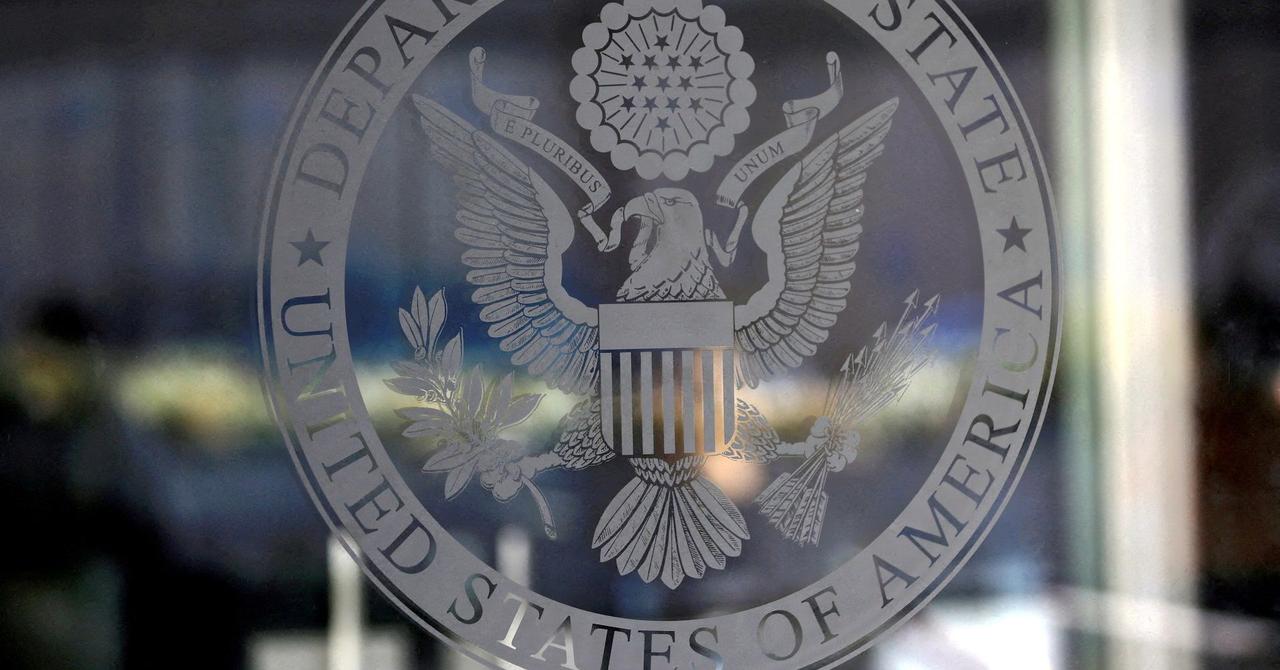U.S. State Department Employs AI for Staffing Selection Boards, Raising Concerns
2 Sources
2 Sources
[1]
US State Department cable says agency using AI to help staff job panels
WASHINGTON, June 9 (Reuters) - The U.S. State Department will use an artificial intelligence chatbot to help it select the people who will perform annual reviews of promotions and moves, according to a cable issued Monday and reviewed by Reuters. The cable said that StateChat, an in-house chatbot which works using technology from Palantir and Microsoft, will be employed to pick foreign service officers for participation on the Foreign Service Selection Boards, the annual evaluation panels which decide whether and how to promote and shuffle around State Department employees. In a statement, a department spokesperson said the evaluations themselves "will not be done by AI." The boards, whose role is governed by the 1980 Foreign Service Act, play a critical role in the State Department's personnel promotion decisions, managing the annual process by which diplomats and others jump from one professional grade to the next. By statute, the boards are meant to include "a substantial number of women and members of minority groups." The State Department has been using StateChat since last year to transcribe notes, draft emails, and analyze diplomatic cables. Last week the agency's acting chief data and AI officer, Amy Ritualo, told a Palantir conference, opens new tab that StateChat had about 40,000 users across her agency. The program's role in the human resources process, however, has not previously been disclosed. Last month the State Department abruptly postponed the boards, and previously selected members received emails saying their services were no longer required. Monday's cable said that StateChat's technology would instead be used to "perform unbiased selection" for the boards based on employees' internally adjudicated skill codes and grades. That list would then be screened - for example for disciplinary and security issues - before being used to create the panels. There was no mention of female or minority representation. President Donald Trump's administration has repeatedly attacked what Republicans refer to as "DEI," a catch-all term covering work protecting civil rights, fighting discrimination, and boosting diversity. The American Foreign Service Association, which represents State Department employees, did not directly comment on the use of AI but said it was seeking clarification from agency leadership about how it intends to comply with its legal obligations around women and minority group representation. Palantir and Microsoft didn't immediately return messages. Although the deployment of AI by officials precedes Trump's reelection in 2024, his administration has aggressively expanded its use since his return to power. Last month Reuters reported that tech tycoon Elon Musk's U.S. DOGE Service was expanding its use of the AI chatbot Grok across the U.S. federal government. In April, Reuters reported that Trump administration officials had told some U.S. government employees that DOGE was using AI to monitor at least one federal agency's communications for hostility to the president. Reporting by Raphael Satter and Humeyra Pamuk; editing by Edward Tobin Our Standards: The Thomson Reuters Trust Principles., opens new tab Suggested Topics:Cybersecurity Raphael Satter Thomson Reuters Reporter covering cybersecurity, surveillance, and disinformation for Reuters. Work has included investigations into state-sponsored espionage, deepfake-driven propaganda, and mercenary hacking. Humeyra Pamuk Thomson Reuters Humeyra Pamuk is a senior foreign policy correspondent based in Washington DC. She covers the U.S. State Department, regularly traveling with U.S. Secretary of State. During her 20 years with Reuters, she has had postings in London, Dubai, Cairo and Turkey, covering everything from the Arab Spring and Syria's civil war to numerous Turkish elections and the Kurdish insurgency in the southeast. In 2017, she won the Knight-Bagehot fellowship program at Columbia University's School of Journalism. She holds a BA in International Relations and an MA on European Union studies.
[2]
US State Department Cable Says Agency Using AI to Help Staff Job Panels
WASHINGTON (Reuters) -The U.S. State Department will use an artificial intelligence chatbot to help it select the people who will perform annual reviews of promotions and moves, according to a cable issued Monday and reviewed by Reuters. The cable said that StateChat, an in-house chatbot which works using technology from Palantir and Microsoft, will be employed to pick foreign service officers for participation on the Foreign Service Selection Boards, the annual evaluation panels which decide whether and how to promote and shuffle around State Department employees. In a statement, a department spokesperson said the evaluations themselves "will not be done by AI." The boards, whose role is governed by the 1980 Foreign Service Act, play a critical role in the State Department's personnel promotion decisions, managing the annual process by which diplomats and others jump from one professional grade to the next. By statute, the boards are meant to include "a substantial number of women and members of minority groups." The State Department has been using StateChat since last year to transcribe notes, draft emails, and analyze diplomatic cables. Last week the agency's acting chief data and AI officer, Amy Ritualo, told a Palantir conference that StateChat had about 40,000 users across her agency. The program's role in the human resources process, however, has not previously been disclosed. Last month the State Department abruptly postponed the boards, and previously selected members received emails saying their services were no longer required. Monday's cable said that StateChat's technology would instead be used to "perform unbiased selection" for the boards based on employees' internally adjudicated skill codes and grades. That list would then be screened - for example for disciplinary and security issues - before being used to create the panels. There was no mention of female or minority representation. President Donald Trump's administration has repeatedly attacked what Republicans refer to as "DEI," a catch-all term covering work protecting civil rights, fighting discrimination, and boosting diversity. The American Foreign Service Association, which represents State Department employees, did not directly comment on the use of AI but said it was seeking clarification from agency leadership about how it intends to comply with its legal obligations around women and minority group representation. Palantir and Microsoft didn't immediately return messages. Although the deployment of AI by officials precedes Trump's reelection in 2024, his administration has aggressively expanded its use since his return to power. Last month Reuters reported that tech tycoon Elon Musk's U.S. DOGE Service was expanding its use of the AI chatbot Grok across the U.S. federal government. In April, Reuters reported that Trump administration officials had told some U.S. government employees that DOGE was using AI to monitor at least one federal agency's communications for hostility to the president. (Reporting by Raphael Satter and Humeyra Pamuk; editing by Edward Tobin)
Share
Share
Copy Link
The U.S. State Department is using an AI chatbot to select members for its Foreign Service Selection Boards, sparking debates about bias and diversity in the process.
State Department Introduces AI for Selection Board Staffing
The U.S. State Department has announced a significant shift in its human resources process, employing an artificial intelligence chatbot called StateChat to assist in selecting members for its Foreign Service Selection Boards. This move, detailed in a cable issued on Monday, marks a notable integration of AI technology into critical personnel decisions within the department
1
.The Role of StateChat in Personnel Selection

Source: Reuters
StateChat, an in-house chatbot utilizing technology from Palantir and Microsoft, will be tasked with choosing foreign service officers to participate in the annual evaluation panels. These boards play a crucial role in determining promotions and reassignments within the State Department
1
.The department spokesperson clarified that while AI will be involved in the selection process, "the evaluations themselves will not be done by AI"
2
. This distinction is crucial, as it maintains human oversight in the final decision-making process.Concerns Over Diversity and Bias
The introduction of AI in this process has raised questions about maintaining diversity in the selection boards. The 1980 Foreign Service Act mandates that these boards include "a substantial number of women and members of minority groups"
1
.Monday's cable stated that StateChat would "perform unbiased selection" based on employees' skill codes and grades. However, it notably omitted any mention of ensuring female or minority representation
2
.Related Stories
Broader Context of AI in Government
This development comes amidst a broader trend of AI integration in government operations under the Trump administration. The U.S. DOGE Service, associated with tech entrepreneur Elon Musk, has been expanding its use of the AI chatbot Grok across federal agencies
1
.Reactions and Concerns
The American Foreign Service Association, representing State Department employees, has not directly commented on the use of AI but is seeking clarification on how the department plans to comply with its legal obligations regarding diversity
2
.The move has also sparked discussions about the Trump administration's stance on diversity, equity, and inclusion (DEI) initiatives, which have been a target of criticism from Republican lawmakers
1
.As AI continues to play an increasingly significant role in government operations, the balance between technological efficiency and maintaining human-centric values in decision-making processes remains a critical point of discussion and concern.
References
Summarized by
Navi
Related Stories
DOGE Accelerates AI Deployment in Government, Raising Concerns Amid Job Cuts
11 Mar 2025•Technology

DOGE's AI Surveillance of Federal Workers Raises Ethical Concerns
08 Apr 2025•Technology

AI to Evaluate Federal Workers' Job Justifications in Controversial DOGE Initiative
25 Feb 2025•Policy and Regulation

Recent Highlights
1
ByteDance's Seedance 2.0 AI video generator triggers copyright infringement battle with Hollywood
Policy and Regulation

2
Demis Hassabis predicts AGI in 5-8 years, sees new golden era transforming medicine and science
Technology

3
Nvidia and Meta forge massive chip deal as computing power demands reshape AI infrastructure
Technology





